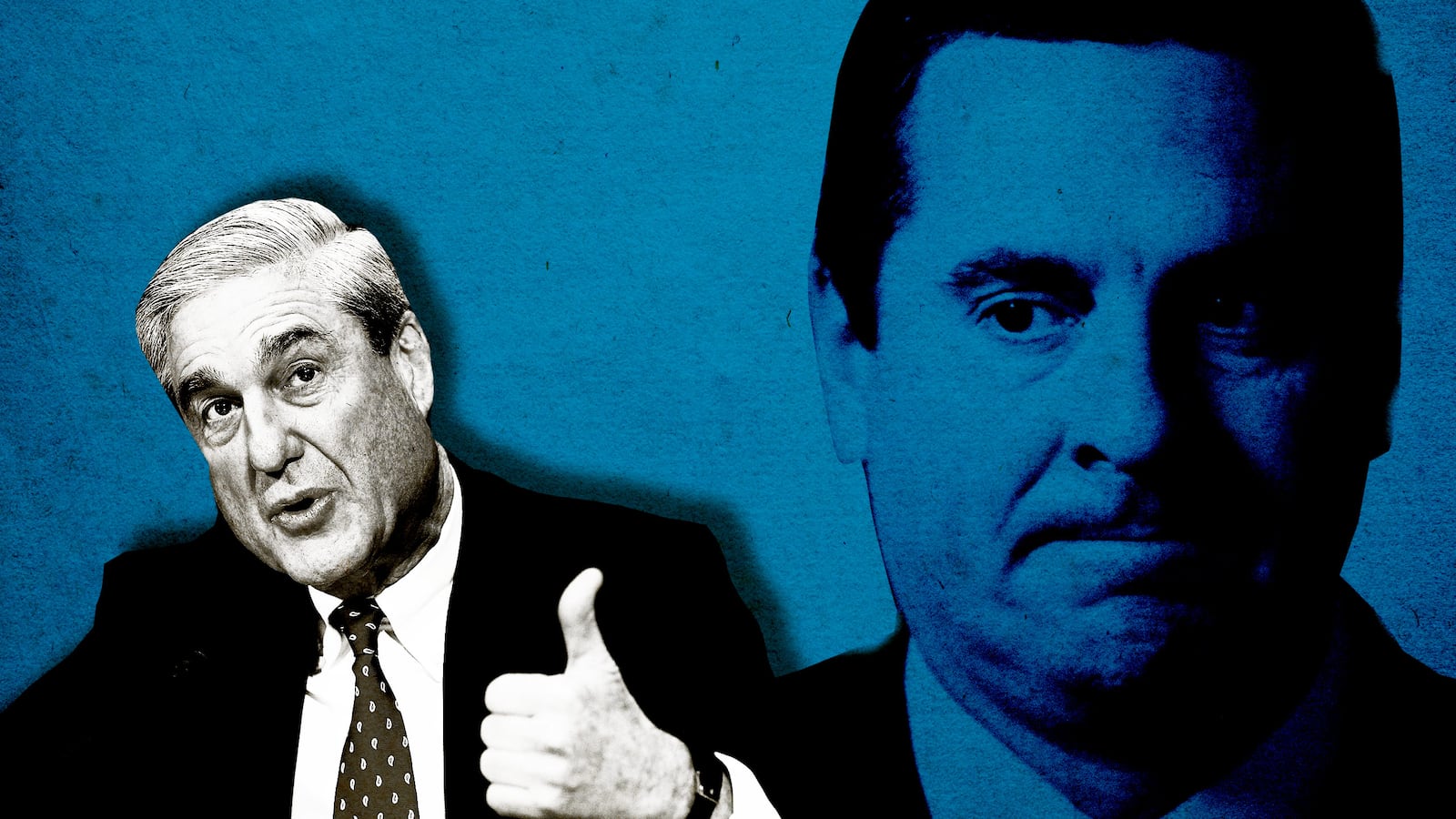Welcome to Rabbit Hole, a breaking-news analysis that helps you get smart on the one story everyone’s obsessing over—for Beast Inside members only.
Rep. Devin Nunes (R-CA) has gone from being an overseer in the Russia investigation to a potential witness in it. Special Counsel Robert Mueller is reportedly investigating potential influence peddling at an inaugural fundraising breakfast attended by Nunes, former National Security Adviser Michael Flynn, and a host of foreign officials from around the world. So where do pricey Eggs Benedict fit in with the rest of the Russia investigation
Best buds: It makes sense that Nunes appeared at the event alongside Flynn, then his fellow Trump transition teammate. The two became close when Flynn was serving as head of the Defense Intelligence Agency for President Obama and Nunes was a junior member of the House intelligence committee, according to a Newsweek profile. The two bonded over Flynn’s Iran-centric view of Middle Eastern terrorism, and Nunes eagerly embraced the general’s conspiracy theories, like the belief that Tehran was somehow behind the attack on the U.S. consulate in Benghazi, Libya. Nunes’ support for Flynn only deepened as President Trump hired him as his national security adviser, only to fire him weeks later for lying about his contacts with Russia’s ambassador. The California Republican has even hired Derek Harvey, Flynn’s pick for National Security Council Middle East director, after H.R. McMaster, who followed Flynn as national security adviser, fired him.
Remember Gates? The apparent probe into inaugural fundraising puts the spotlight back on one of the forgotten characters in the Trump Russia investigation. Rick Gates, a former aide to Paul Manafort’s consulting company, served as the star witness for the special counsel’s cases against Manafort. His testimony helped convict Manafort on tax- and bank-fraud charges in Virginia, and it’s likely he would’ve testified in the D.C. lobbying trial had Manafort not pleaded out.
But Gates’ value to Mueller may go beyond sinking Manafort. In 2016, Gates followed Manafort into the Trump campaign as a staffer and stayed on after the election to work on the Trump inaugural committee. We know Gates has already testified about shady dealings that went on with the inaugural committee. For example, he told a courtroom in Virginia that Manafort had emailed a list marked “urgent” of those he wanted to receive tickets to Trump’s inauguration, including Steve Calk, a CEO whose bank Manafort had sought to borrow millions from based on allegedly fraudulent loan applications. At trial, prosecutors insinuated that Manafort used the tickets in part to woo Calk and get him to approve the loans.
Several ongoing investigations: Could Gates be helping out the Special Counsel’s Office in its inaugural fundraising investigation? It would certainly explain some things. In filings before the D.C. District Court, Mueller has repeatedly postponed sentencing for Gates, who copped a plea deal in exchange for his cooperation. As recently as Nov. 14, prosecutors asked to push back sentencing because “Gates continues to cooperate with respect to several ongoing investigations.” Note the mention of investigations (plural) and the date (well after Manafort had already copped a plea on his D.C. lobbying charges). Clearly he’s still helping out with something now that Manafort is sentenced and behind bars.
On Tuesday, we might get at least a hint of whether that work is still ongoing. That last joint status report in November set a due date of Jan. 15 to brief the court on whether Gates is ready for sentencing.
Systemic problems: One of the themes running through the various episodes of the Russia investigation miniseries is foreign influence. Whether it’s Manafort secretly lobbying on behalf of Ukraine’s former pro-Russian government, Flynn secretly lobbying on behalf of the Turkish government, or the court filings reportedly about unnamed Middle Eastern countries’ attempts to influence the 2016 election—each of these mini-dramas has a foreign-influence case lurking not far from it.
The go-to legal tool for addressing foreign-influence issues is often the Foreign Agents Registration Act, the obscure and until now barely enforced statute that demands foreign agents register with the Justice Department and provide some modicum of transparency about which countries are paying them to do what. Mueller’s willingness to enforce the law has spooked lobbyists and prompted a spike in registrations where once would-be filers had ignored it.
Before the special counsel came around, FARA didn’t have the kind of teeth you might expect. For example, in September 2016, as the election and foreign interference were in full swing, the Justice Department inspector general released a little-noticed report warning that registrations had peaked in the late 1980s and sharply declined afterward with only seven criminal cases brought under FARA from 1966 to 2015. The FARA registration unit, investigators noted, had “limited staff” and lacked a “comprehensive FARA enforcement strategy.” The Inspector General’s Office also agreed that Congress should give FARA personnel the kind of civil investigative demand authority—a subpoena-like ability to demand documents—enjoyed by regulatory staff in a number of financial and commercial investigations.
All things must pass: Mueller’s investigation will end at some point (likely soon, if you believe the Rosenstein tea leaves) and absent any similar zeal for enforcement among career prosecutors or appointed Justice Department officials, what’s to stop the tide of unreported foreign influence that made the Russia scandals possible from washing back over the nation’s capital? While the public obsesses over the details of Mueller’s investigations, there’s been precious little attention to maintaining or strengthening the laws that made them possible.
Nonetheless, ensuring that FARA law is routinely enforced by regular prosecutors rather than special ones may end up being more important for holding a light on foreign influence in American politics than the Mueller investigation.






